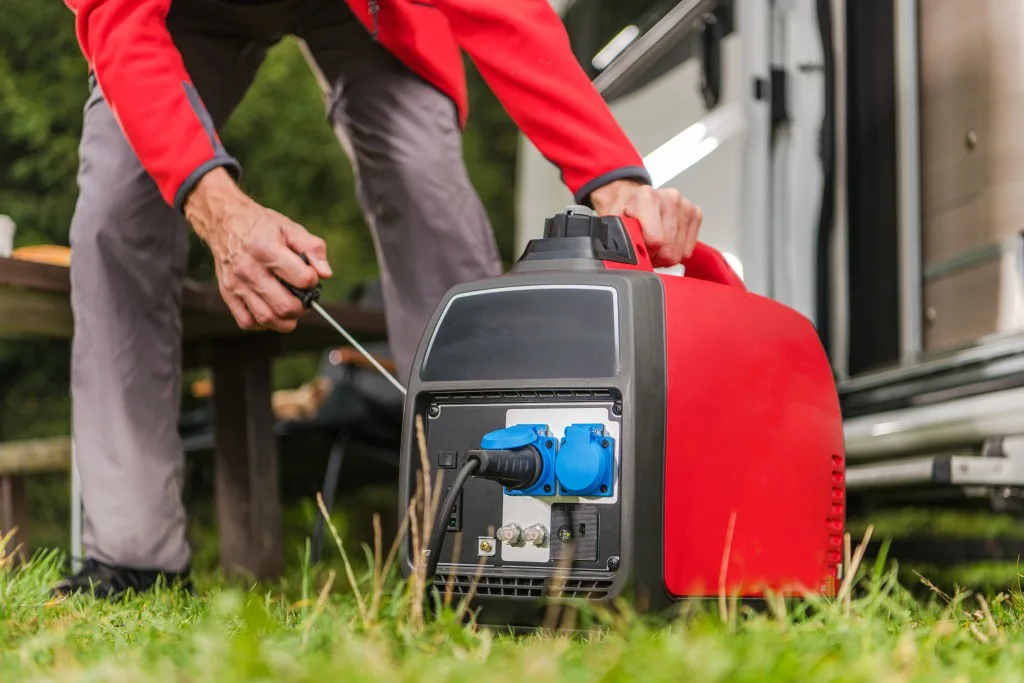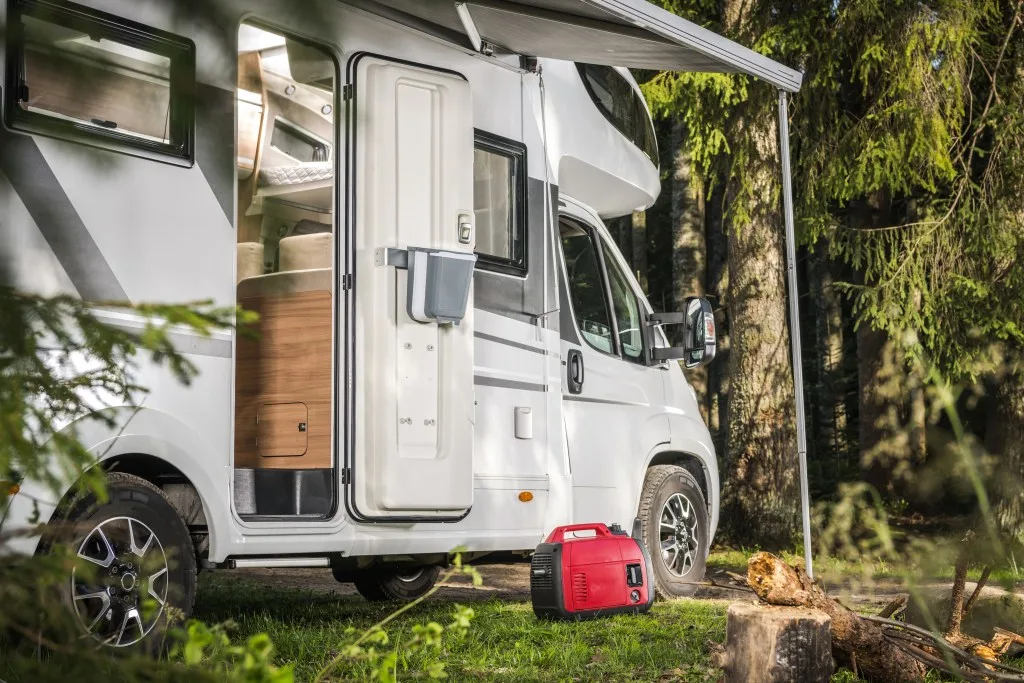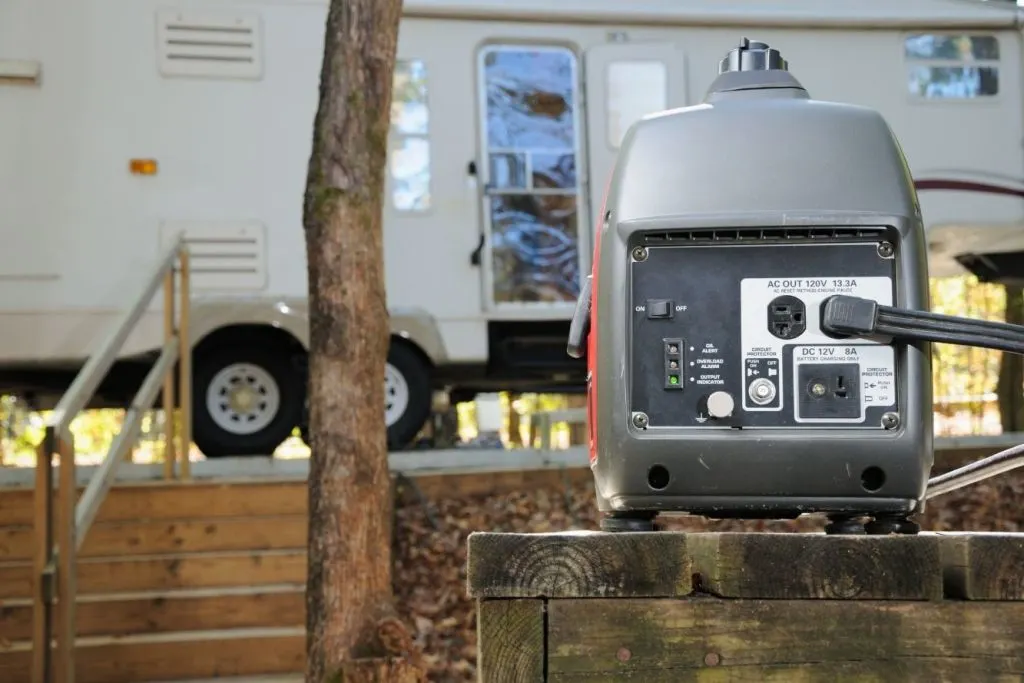RV generators are one of the most cost-effective ways to be self-sufficient for power while camping. Unfortunately, they’re not the perfect solution for every situation.
Some of the hidden costs of these devices are causing many to think twice about using them. They may be doing more harm than good, especially to the environment.
Today, we’re sharing five reasons to avoid using RV generators. It may change the way you camp.
Let’s check it out!
What Are RV Generators?
An RV generator is typically an internal combustion engine that creates alternating current (AC) power. The electricity generated is for powering electrical devices and charging batteries. Many owners use the power to camp in remote areas where an electric pedestal isn’t available.
You’ll find portable units and some built-in to the camper. The larger the engine, the more power it can create. And that means you can use more devices requiring electricity.
Depending on your power needs, you can use your trailer seamlessly off the grid. However, since RV generators don’t have infinite capacity, you may need to manage your power usage during your trip.

What Size Generator Do You Need for an RV?
You want to get the right size generator suitable for your RV. If you choose one that’s insufficient, you’ll need to monitor your power usage to avoid overloading it. If you go too big, you may end up wasting money and storage space lugging it around during your travels.
A 30-amp trailer has a maximum power draw of 3,600 watts. On the other hand, a 50-amp trailer has a top draw of 12,000 watts. If you want full use of your camper, we recommend purchasing an RV generator capable of creating enough watts for your rig.
However, it’s important to remember that you don’t always need full power in your rig. For example, most vehicles can go over 100 mph, but how often do you drive that fast? If you’re a responsible driver, you never push your car’s speedometer to the max.
It’s possible to use a 2,000-watt unit with a 50-amp trailer. It just means you’ll want to manage your power. You may only have enough capacity to run one power-hungry device at a time. If you want to make a cup of coffee, you might need to turn off the air conditioner or heater. It’s not always easy to juggle between appliances, but it’s possible.
Pro Tip: Make sure you know these 7 Things to Know About Camping Generators before you invest in one.
Can You Run Your RV Generator All Day?
Most RV generators can handle being on all day. However, it’s important to remember how you’re using it. If pushing the unit to its limit, you could increase the wear and tear on it. Additionally, you’ll quickly burn through fuel. However, if you’re using no more than 50% to 75% of the capacity, it’s typically not a problem.
Some campgrounds restrict the use of generators or only permit them during certain hours. When making your reservations, you might want to check the rules and regulations if you plan to run yours during your stay.

5 Reasons to Reconsider Using RV Generators
While RV generators can come in handy, there are some reasons why you might want to avoid them. Let’s look at why you should reconsider when and how you use them.
Noise
Nothing is worse than relaxing at your campsite when all of a sudden, your neighbor cranks up a noisy generator. Most campers like to enjoy the sounds of nature and to spend time in a peaceful environment. If they wanted to hear a loud motor humming for hours, they’d mow a yard or two.
Most of these devices run from 48 to 65 decibels within 50 feet. That’s roughly the equivalent of a vacuum cleaner. While we understand their usefulness, it’s incredibly rude to those camping around you. It may even ruin their experience.
Maintenance
One of the worst things about these units is their constant need for attention. You need to keep track of your usage and when to change the oil and perform other maintenance.
If they’re not maintained properly, you could cause severe damage to them. In the worst cases, the motor could be permanently damaged. You could also find yourself in a sticky situation where you need power, but your generator has thrown in the towel.
Neither of these is an ideal option. It’s one reason why many don’t like depending on them.

Fuel Consumption
As the amount of power increases, so does the fuel a generator needs to consume. If you’re running an air conditioner or electric heater, it’ll require a lot of power. You could burn several gallons of gas depending on how long you use them. Diesel generators are the most fuel-efficient but are more expensive and heavy.
If you do purchase an RV generator, a gasoline-powered unit might be more convenient since the fuel is readily available. However, that’s not always the case. The nearest gas station could be a considerable distance depending on where you’re camping.
Emissions
Small off-road engines have been in the news lately, mostly because of the pollution they create. This includes devices like leaf blowers, lawnmowers, and portable generators. Some of these small gas-powered engines can produce more pollution than vehicles.
Certain states, like California, are tightening restrictions on producers of these products. They require manufacturers to meet standards that help reduce emissions. The hope is to phase out the older engines that create so much pollution. It may be difficult in the future to use RV generators in some of these places.
Safety
Not only are RV generators bad for the environment, but they’re also bad for humans. Over the years, there’ve been several horror stories of these devices causing deaths. The exhaust they create is toxic. To avoid a dangerous situation, sufficient ventilation is necessary.
It would be best to point the exhaust away from you and anyone camping nearby. If you or someone around you uses a generator, an indoor carbon monoxide detector can help save a life should the fumes find their way inside an RV.
Pro Tip: We compared Camping Generators: Decent, Better & Best to help you decide which is the right choice for you.
Are RV Generators Worth It?
While RV generators are useful, they’re not the best option. We love seeing the community gravitating toward cleaner and greener options like solar power.
While it may not be cheap, power generated by the sun eliminates harmful emission concerns and allows everyone to enjoy silence. Combining solar panels with inverters and large lithium battery banks can allow you to run almost anything in your rig. Plus, you’ll be able to enjoy the sounds of nature instead of the annoying humming of a running engine.
Discover the Best Free Camping Across the USA
To be honest with you, we hate paying for camping. There are so many free campsites in America (with complete privacy).
You should give it a try!
As a matter of fact, these free campsites are yours. Every time you pay federal taxes, you’re contributing to these lands.
Become a FREE CAMPING INSIDER and join the 100,000 campers who love to score the best site!
We’ll send you the 50 Best Free Campsites in the USA (one per state). Access the list by submitting your email below: